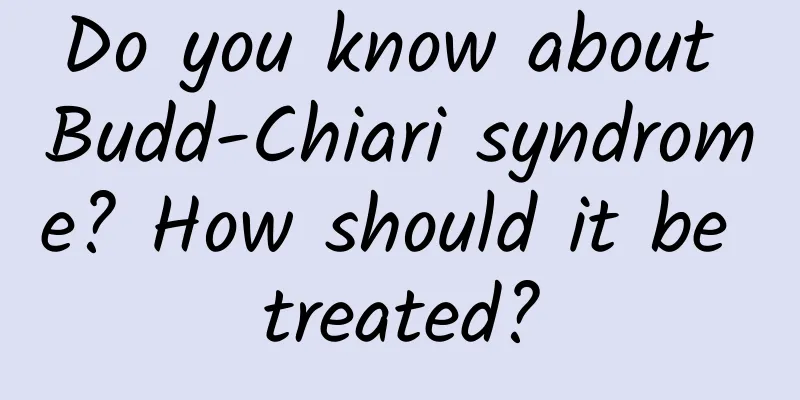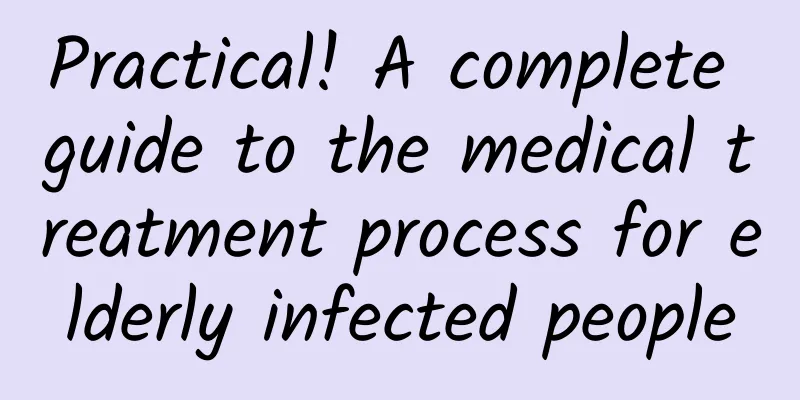Do you know about Budd-Chiari syndrome? How should it be treated?

|
Author: Chen Xueming, Chief Physician, Beijing Friendship Hospital, Capital Medical University Reviewer: Shen Chenyang, Chief Physician, Beijing Tiantan Hospital, Capital Medical University For us healthy people, blood is sent out from the heart, transported to various parts of the body, and then flows back to the heart through the venous system. In the process of returning to the heart, there is a blood vessel close to the heart called the hepatic vein. The blood flow from our gastrointestinal tract, the food we eat and the water we drink, passes through the superior mesenteric vein and enters the liver through the portal vein for processing and detoxification. After these nutrients are broken down, they return to the heart through the hepatic vein. Figure 1 Original copyright image, no permission to reprint If the hepatic vein is blocked, the blood in the liver cannot flow back, which will cause congestion and swelling of the liver, thereby causing portal hypertension. Portal hypertension is divided into three types: prehepatic, posthepatic, and hepatic. If the last barrier in the liver, which is the opening of the hepatic vein, is blocked, posthepatic portal hypertension will be formed, which we call "Budd-Chiari syndrome." Of course, Budd-Chiari syndrome can also cause obstruction of the inferior vena cava leading to inferior vena cava hypertension, and obstruction of the hepatic vein leading to liver congestion, hepatomegaly and other related symptoms. In general, Budd-Chiari syndrome is a disease with relatively high risk, and early detection and active treatment should be carried out as much as possible. If the disease develops to the late stage, the mortality rate is very high, which will bring great burden to the family and society. 1. How to treat Budd-Chiari syndrome? In terms of pathological type, Budd-Chiari syndrome is divided into two types, namely diaphragmatic type and thrombotic type. Different pathological types, different clinical manifestations, and different family economic conditions will lead to different treatment methods adopted by doctors. For example, for patients with diaphragmatic type, the treatment effect is generally very good. They can choose conservative treatment or interventional treatment, which is to open up the lesion through a catheter or balloon. They can also undergo surgical treatment to restore blood flow. For patients with thrombosis, such as acute hepatic vein thrombosis, sudden fever, sudden pain, and increased ascites, conservative treatment is generally effective, and the efficacy of thrombolysis can reach more than 90%. If the thrombus is dissolved in time and the blood flow in the hepatic vein and inferior vena cava is restored, the disease will be cured. Long-segment occlusion caused by old thrombosis of the inferior vena cava and hepatic vein can only be treated by open surgery. The commonly used percutaneous transjugular transhepatic portal vein puncture shunt (TIPPS) in interventional treatment is generally not recommended for young patients because of its poor long-term efficacy. Therefore, different treatment methods are used for different patients. 2. How is interventional treatment of Budd-Chiari syndrome performed? Interventional treatment has certain indications and can only be used for diaphragmatic, occlusive and stenotic lesions. The specific method is to insert a needle through the base of the thigh, then insert a guide wire into the blocked area, and then insert a special balloon catheter to forcefully expand and open the membrane. This is interventional treatment. If the membrane is thick, or the lesion is thick, and it shrinks after being opened up, you can add a stent to support this part permanently. Its advantages are that patients do not need surgery, local anesthesia is sufficient, the trauma is small, the recovery is fast, and the cost is relatively low. Therefore, if patients can receive interventional treatment, we should all receive it. Figure 2 Original copyright image, no permission to reprint 3. What should patients with Budd-Chiari syndrome pay attention to in their diet? Patients with Budd-Chiari syndrome need to be aware of some dietary considerations. First, to protect your liver, eat more foods rich in vitamins, such as vegetables and fruits that are high in vitamin C, vitamin E, and vitamin B. Second, don’t eat something hard, because portal hypertension can cause varicose veins in the esophagus and stomach. If these hard foods cut the varicose veins, it is likely to cause heavy bleeding, leading to vomiting blood and endangering life. Third, don’t eat foods that are difficult to digest. Eating foods that are difficult to digest will cause bloating. If the food cannot be digested and absorbed, it will cause bloating. Try to eat foods that are high in protein and easy to digest. Another thing everyone needs to understand is that for patients with hepatic encephalopathy, high-protein foods such as meat and eggs should be controlled and not eaten too much at one time. Because the liver is the place where albumin is synthesized. If the liver is congested for a long time, the machine that synthesizes albumin will not function or synthesize, just like a rusted machine. It cannot produce anything and the food we eat cannot be decomposed. Our diet contains a lot of toxins, which need to go through some collateral circulation to be broken down. If they do not pass through the liver and are not broken down, they will directly reach all parts of the body, especially the head, which can easily induce hepatic encephalopathy and cause dizziness. Therefore, patients with hepatic encephalopathy should pay attention to controlling their protein intake. |
<<: Does carotid stenosis have symptoms? Is there a treatment?
>>: Could dizziness, hearing loss, tinnitus, and stuffy ears be Meniere's disease?
Recommend
What is the meaning of eating mooncakes on August 15th? Why do we eat mooncakes?
Mooncakes, also known as moon cakes, small cakes,...
What is bleeding between periods?
The most common phenomenon during menstruation is...
What to do if you have these flu symptoms? CDC Tips →
Temperatures in many places have risen significan...
What fruits are suitable to eat during menstruation
There are many common problems during the menstru...
Why does progesterone become low during pregnancy?
Pregnancy is a very special period for women'...
What to do when you reach menopause at age 30?
Female friends should first know that menopause b...
Why do women always feel damp on the soles of their feet?
Many women experience this situation, that is, th...
What foods can delay aging in women?
If there are too many toxins accumulated in the b...
There is white flesh at the vaginal opening
We all know that the female vagina is particularl...
What is the reason for the bad smell coming from women's private parts?
Everyone has their own special body odor, but som...
What happens if you frequently stimulate your vagina?
A normal male penis is about 7-10 cm in length wh...
How to get rid of the dark belly after childbirth?
Due to the influence of progesterone, new mothers...
Beware! Don’t let a stroke strike you unprepared after the holidays! Save these tips for saving your life
After the Spring Festival holiday, people gradual...
I have been nearsighted for many years. Should I have surgery?
When others draw highlights, the position of thei...
Why do women have a small belly?
In real life, some women are not very old but hav...









